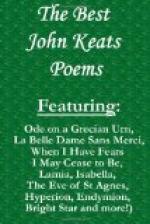|
This section contains 6,083 words (approx. 21 pages at 300 words per page) |

|
Sperry, Stuart M. “Tragic Irony in The Fall of Hyperion.” In English Romantic Poets: Modern Essays in Criticism, edited by M. H. Abrams, pp. 470-85. London: Oxford University Press, 1975.
In the following essay, Sperry asserts The Fall of Hyperion is an expression of tragic irony. The critic also considers Adam and his dream as an allegory for poets and poetry.
As prelude to the dreamer's coming vision, the brief paragraph of eighteen lines with which the induction to The Fall begins clearly establishes Keats's major theme—the dream itself, taken, as from the first he always had, as the fundamental source of poetry:
Fanatics have their dreams, wherewith they weave A paradise for a sect; the savage, too, From forth the loftiest fashion of his sleep Guesses at Heaven; pity these have not Trac'd upon vellum or wild Indian leaf The shadows of melodious utterance. But bare of...
|
This section contains 6,083 words (approx. 21 pages at 300 words per page) |

|


